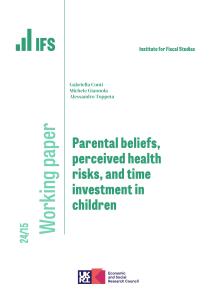We estimate the impact of the Mexican conditional cash transfer program, Progresa, on the time mothers and older sisters spend taking care of children younger than 3. We exploit the random allocation of the program and heterogeneity in household composition for identification, and apply the methodology in Lewbel [2000]. We find that mothers in treatment households substitute their first teenage daughter in the provision of child care. As a result, daughters devote more time to schooling and less time to taking care of their younger siblings. Overall, total household hours to child care increase. These findings indicate that Progresa not only fosters human capital accumulation through keeping teenage girls in school but also through more and arguably better (mother provided) child care.
Authors

Research Associate
Marta is a Research Associate, working at the Centre for Evaluation of Development Policies at IFS and at the Inter-American Development.

Research Fellow Toulouse School of Economics
Pierre is a Research Fellow at the IFS, a Professor of Economics at the Toulouse School of Economics and a co-editor of the JEEA.
Journal article details
- Publisher
- Institute for Fiscal Studies
- Issue
- January 2012
Suggested citation
Dubois, P and Rubio Codina, M. (2012). 'Child care provision: semiparametric evidence from a randomized experiment in rural Mexico' (2012)
More from IFS
Understand this issue

Sure Start achieved its aims, then we threw it away
15 April 2024

If you can’t see it, you can’t be it: role models influence female junior doctors’ choice of medical specialty
24 April 2024

A mess has been made of Child Benefit, and the clear-up operation may not be easy
29 March 2024
Policy analysis

The short- and medium-term impacts of Sure Start on educational outcomes
9 April 2024

Progression of nurses within the NHS
12 April 2024

Regional variation in earnings and the retention of NHS staff in Agenda for Change bands 1 to 4
10 April 2024
Academic research

Labour market inequality and the changing life cycle profile of male and female wages
15 April 2024

Parental beliefs, perceived health risks, and time investment in children
15 April 2024

Interpreting cohort profiles of lifecycle earnings volatility
15 April 2024